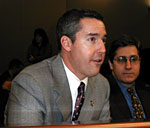By Michael Khoo
Minnesota Public Radio
December 13, 2001
The Minnesota stadium debate took a step back from baseball to focus on the state's football needs. The Minnesota Vikings and the University of Minnesota appeared before an 18-member stadium task force to outline their facility needs. Last session, the Vikings proposed a new stadium to be shared with the university's Golden Gophers. At the time, the plan seemed to satisfy some lawmakers desire to see a public-private partnership. But the testimony underscored the difficulty of placing two tenants in one facility.
| |
|
|
|
||
The ongoing threat of contraction has focused the stadium debate on the Minnesota Twins, but the Vikings have been patiently waiting for their turn at the table. During the football hearing, executive vice president Mike Kelly sounded a complaint similar to the Twins. He says the Metrodome simply doesn't provide the luxury seats, concession opportunities, and other revenue sources needed to support a competitive football team.
"I wouldn't have even agreed to take this on if I weren't convinced that we're maximizing all of the revenue opportunities that we have at the dome. We're selling. We just don't have enough to sell," he said.
The Vikings are proposing a $500 million, retractable roof stadium to be located on the U of M campus. Kelly says the team and the National Football League will put up $150 million. The rest would come from a state loan to be paid off through some combination of user fees and entertainment and tourist taxes.
| |
|
|
|
||
State Planning Director Dean Barkley pointed out the team currently has a lease at the Metrodome through 2011. And he wondered why the public should put its faith in a new, 33-year lease even as the team is seeking release from its current obligations.
"How can we make sure - if we go down that path - that if the income streams change - and they do - that we're not going to be back here 12 years early from that 33 years looking at this same problem?" he asked.
Neil Glatt, the NFL's vice president of strategic planning, said the Vikings "are a have-not, in terms of local revenue." He said by 2004, the Minnesota franchise will rank 31 out of 32 teams in local revenue.
Kelly says the team will soon fall $27 million behind average league revenues and simply can't compete at the dome under current conditions. He did, however, leave open the possibility of a short-term fix. He says if the Vikings' lease can be renegotiated to direct more stadium revenues to the team, it could buy time until a permanent solution is reached.
But a permanent solution may have hit a snag. The plan calls for a stadium to be shared with the University of Minnesota. University spokeswoman Sandra Gardebring, however, told task force members a new stadium remains low on the school's priority list, particularly in light of budget restraints.
"As you may recall, our 2002-03 biennial budget request was funded at about 50 percent of the amount we requested; a funding shortfall that we met by increasing tuition an average of 13 percent across collegiate units. We have already projected at tuition increase for next school year of at least 13 percent as well," she said.
And a growing deficit in the university's athletic program is leading some officials to question the value of a shared facility.
Tom Moe, the director of men's athletics, says he'd prefer a Gophers-only stadium over which the university would have greater control. "It's not just a football stadium. It's a facility that would have entertainment events 300 times, 300 nights a year. And I've got a concern about how that all plays into my desire for the university to have something that is collegiate and attracts people that care about the university back to campus," Moe said.
Recognizing the university's hesitation, Kelly told the task force the team is willing to pursue a stadium on its own.
"If the University of Minnesota has no interest in working with us, we need to move on in a different direction. We've spent an awful lot of time and awful lot of money trying to accommodate and at least do the best we can to address the situation," he said.
Kelly says a Vikings-only stadium would actually be cheaper, but not cheaper than an alternative advanced by the Metropolitan Sports Facilities Commission, which owns and operates the dome. The commission has proposed modifying the Metrodome to accommodate football fans, but the Vikings have so far rejected the idea.
More from MPR
